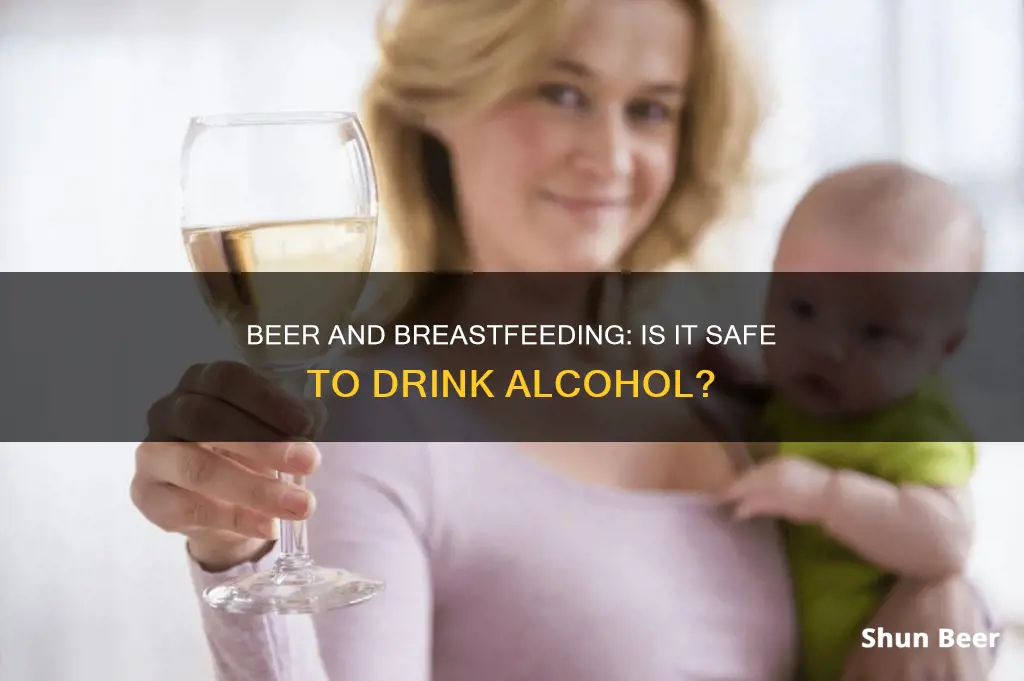
Drinking alcohol while breastfeeding is a controversial topic, with some sources advising abstinence and others stating it carries little risk. The general consensus is that drinking small amounts of alcohol while breastfeeding is safe, but opinions vary over the amount that is considered safe.
Alcohol passes freely into breast milk, with levels typically peaking 30-60 minutes after consumption. The concentration of alcohol in breast milk gradually falls as the body metabolises it, and it is not stored in the breast. Therefore, pumping and dumping is not necessary unless the mother is uncomfortable.
Most sources recommend waiting at least two hours after drinking alcohol before breastfeeding again. The more drinks consumed, the longer it takes for the alcohol to clear the mother's system. It is also important to consider the baby's age, as newborns have immature livers and are more affected by even small amounts of alcohol.
While occasional light drinking while breastfeeding has not been shown to have adverse effects on babies, regular or heavy drinking may affect milk supply, make the baby sleepy, or impact their growth and development. Therefore, moderation is key, and drinking alcohol while breastfeeding should be done sparingly, if at all.
| Characteristics | Values |
|---|---|
| Can I drink alcohol and breastfeed? | No harmful effects to babies have been found when breastfeeding mothers drink no more than one drink a day. |
| How much alcohol can I drink? | The American Academy of Pediatrics recommends limiting alcohol consumption to no more than 0.5 g of alcohol per kg of body weight, which is approximately two beers for a 60 kg mother. |
| How long after drinking alcohol can I breastfeed? | It is recommended to wait at least two hours after drinking alcohol before breastfeeding. |
| Does alcohol increase milk production? | Alcohol does not increase milk production and has been shown to inhibit let-down and decrease milk production. |
| What are the risks to the baby? | Excessive alcohol consumption by the mother can result in slow weight gain, decreased milk intake, impaired sleep, delayed motor development, and potential impairment of cognitive development in the baby. |
What You'll Learn

Is it safe to drink alcohol while breastfeeding?
It is generally agreed that drinking small amounts of alcohol while breastfeeding is safe and will not harm your baby. However, opinions vary over the amount of alcohol that is considered safe for a breastfeeding mother to consume.
Alcohol in breast milk
Alcohol does pass from your bloodstream into your milk and can be detected in breast milk for about 2 to 3 hours after a single drink is consumed. The amount of alcohol in breast milk is similar to that found in maternal blood and peaks 30 to 60 minutes after drinking an alcoholic beverage.
Pumping and dumping
There is no benefit to "pumping and dumping" breast milk after drinking alcohol unless it is done for the mother's comfort. As blood alcohol levels drop, so will the alcohol levels in breast milk. Pumping and dumping will not speed up this process.
How long to wait after drinking alcohol before breastfeeding
The more drinks that are consumed, the longer it takes for the body to clear the alcohol from the system. It is recommended to wait until the body has completely metabolised the alcohol before nursing the baby again. As a general rule, if you are sober enough to drive, you are sober enough to breastfeed.
Alcohol and milk supply
Studies have shown that alcohol can affect the balance of hormones that control breast milk production (prolactin and oxytocin) and can reduce supply. Moderate consumption can reduce oxytocin levels, affecting milk supply and let-down. Alcohol itself hinders both the milk ejection reflex and milk production, especially when consumed in large amounts.
Alcohol and baby's sleep
Alcohol in breast milk can change the way the baby feeds and may cause them to be reluctant to feed. It can also make the baby sleepier and cause them to sleep for shorter amounts of time.
Long-term effects
The long-term effects of drinking alcohol while breastfeeding are less clear and further research is needed. However, drinking regularly or heavily while breastfeeding is not advised, as it may affect the baby's growth and development.
Young Adults and Alcohol: A Small Beer Too Much?
You may want to see also

How long should I wait after drinking alcohol to breastfeed?
It is recommended that breastfeeding mothers wait at least 2 hours after drinking a single alcoholic beverage before nursing their baby. This allows time for the alcohol to leave the breast milk. Alcohol levels in breast milk are usually highest 30 to 60 minutes after consuming an alcoholic drink, and alcohol can typically be detected in breast milk for about 2 to 3 hours per drink. However, the length of time alcohol can be detected in breast milk increases with the amount of alcohol consumed. For example, alcohol from 2 drinks may be detected for about 4 to 5 hours, while alcohol from 3 drinks may be detected for about 6 to 8 hours.
To avoid exposing your baby to any alcohol in your milk, you can try avoiding breastfeeding for 2 to 3 hours for every drink you have. If your baby needs to be nursed before this time has passed, you can feed them with previously expressed milk. Planning ahead is important, and it is recommended to breastfeed right before consuming an alcoholic drink to maximise the amount of time before your baby wants to nurse again. If your breasts become uncomfortably full while waiting, you can express or pump and discard the milk.
It is important to note that drinking alcohol is not recommended during breastfeeding, as it can pass into the breast milk and may have negative effects on the baby's development, growth, and sleep patterns. Excessive alcohol consumption can also decrease milk supply and impair a mother's judgment and ability to care for her child safely. Therefore, it is crucial to drink in moderation and follow the recommended waiting times before breastfeeding.
Beer Drinking and Weight Gain: Daily Habit's Impact
You may want to see also

What are the short-term effects on my baby?
It is important to note that the effects of alcohol on a nursing infant are dose-dependent. The more alcohol a mother consumes, the more pronounced the effects on the baby. Here are some of the short-term effects of drinking beer on a breastfeeding baby:
- Sleep disturbances: Alcohol has been shown to disrupt the sleep patterns of breastfed infants. While some studies reported no change in the total amount of sleep, they noted that sleep was more fragmented. In contrast, other studies demonstrated that the total duration of sleep decreased by about 20-25% after infants consumed alcohol-containing milk. These effects typically last for 3-4 hours after feeding, and babies compensate by sleeping more in the next 20 hours.
- Decreased milk intake: Alcohol inhibits the release of oxytocin, which is responsible for the milk ejection reflex. As a result, babies consume approximately 20-23% less milk in the first 3-4 hours after the mother consumes alcohol.
- Increased awake times and irritability: Occasional small amounts of alcohol can make babies more awake and irritable.
- Altered taste and smell of breast milk: Alcohol can change the way breast milk tastes and smells, which may cause the baby to be reluctant to feed.
- Reduced milk supply: Alcohol can affect the balance of hormones that control breast milk production (prolactin and oxytocin) and reduce milk supply.
- Potential impact on weight gain: Daily alcohol consumption has been linked to a risk of slow weight gain in infants.
- Delayed motor development: Regular alcohol consumption (1 or more drinks daily) has been associated with a decrease in gross motor development.
Beer Trading: How Does It Work?
You may want to see also

Does drinking alcohol affect my milk supply?
Drinking alcohol can indeed affect your milk supply.
Alcohol can be detected in breast milk as soon as 30-60 minutes after consumption, and can remain in breast milk for an hour or more. The amount of alcohol in breast milk is closely related to the amount in the mother's blood, and the highest levels occur 30 to 60 minutes after drinking an alcoholic beverage. However, this time is delayed if the drink is consumed with food.
Drinking alcohol can slow down the milk ejection reflex, or letdown, and decrease the amount of milk available to the baby. It can also negatively impact the hormones affecting milk production, decreasing the supply. One study found that drinking as little as 0.3g of alcohol per kg (less than the amount considered acceptable by the American Academy of Pediatrics) reduced milk production by about 10%. Another study found that infants consumed 20-23% less milk in the first four hours after the mother consumed alcohol.
It is recommended that mothers wait until the alcohol has been metabolised before nursing again. The time this takes depends on the mother's weight and the number of drinks consumed. For example, a 130-pound woman who drank one glass of wine would need to wait two hours and 24 minutes before nursing again.
It is important to note that the effects of alcohol on milk supply are complex and depend on the pattern of drinking. Casual use of alcohol (such as one glass of wine or beer per day) is unlikely to cause short- or long-term problems for the baby, especially if the mother waits two to two-and-a-half hours per drink before nursing. However, daily heavy use of alcohol (more than two drinks per day) may decrease the length of time that mothers breastfeed.
Beer and Lip Injections: What's Safe to Drink?
You may want to see also

What are the long-term effects on my baby?
While there is limited research on the long-term effects of drinking alcohol while breastfeeding, there are some studies that have been conducted.
One study of 400 infants investigated infant development at one year in relation to maternal alcohol use while breastfeeding. It found that cognitive development was not affected by maternal alcohol use. However, indices of motor development were significantly lower in infants exposed regularly to alcohol in breast milk, even after controlling for prenatal alcohol exposure. The researchers observed an inverse dose-response relationship between the frequency of maternal alcohol consumption and motor development scores. Infants of breastfeeding mothers who had one or more drinks daily had lower scores than infants exposed to less alcohol in breast milk. This association persisted after controlling for over 100 potential confounding variables, including smoking and use of other drugs. The effect was more pronounced when mothers who supplemented breastfeeding with formula were excluded from the analysis.
Another study from the same group found no association between alcohol exposure and developmental scales in a group of 18-month-old children. The researchers noted that the tests used in these studies may be limited in their ability to detect small effects in infants and toddlers, and suggested that studies of older children may be more useful in assessing the effects of drinking while nursing.
Data from a longitudinal study of 5,107 Australian infants and their caregivers recruited in 2004 supported the findings of the previous study. Heavier maternal alcohol consumption at the initial assessment was associated with dose-dependent reductions in abstract reasoning at ages 6 to 7 years in children who had been breastfed. This association was not observed in infants who had never been breastfed, suggesting that exposure to alcohol via breast milk, rather than psychosocial or environmental factors associated with that exposure, was responsible for the reductions in cognitive functioning observed in breastfed infants. This finding was independent of prenatal alcohol use, sex of child, maternal age, income, birth weight, and breastfeeding duration.
It is important to note that the long-term effects of drinking alcohol while breastfeeding are still not fully understood, and more research is needed to draw definitive conclusions. The existing studies suggest that occasional light drinking while breastfeeding is unlikely to cause long-term harm to the baby, but regular or heavy drinking may have negative effects on the baby's development.
Is Root Beer Safe for Children?
You may want to see also
Frequently asked questions
Yes, it is safe to have a beer while breastfeeding, but only in moderation. It is recommended to wait until your body has completely metabolized the alcohol before nursing your baby again.
The more drinks you have, the longer it takes for your body to clear the alcohol from your system. It is recommended to wait at least 2 hours after drinking one standard drink before breastfeeding.
Pumping and dumping is not necessary, as it does not speed up the elimination of alcohol from your breast milk. However, if you are feeling uncomfortable, you may pump and discard the milk for your own comfort.
Yes, alcohol can affect the hormones that control breast milk production and may reduce your supply. It can also inhibit the milk ejection reflex, resulting in decreased milk intake by the baby.
Drinking alcohol in moderation has been shown to have minor short-term effects on your baby's behaviour, such as increased awake time and irritability. It can also alter the taste and smell of your breast milk, which may affect your baby's feeding patterns.







